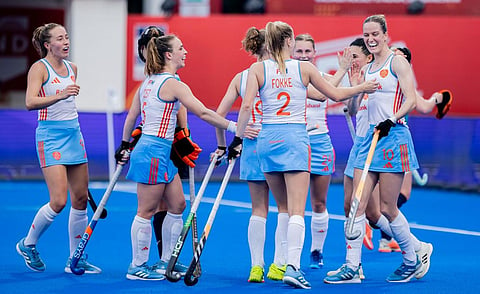

BHUBANESWAR: If the only true mark of excellence in a team sport is the big titles, the Dutch women's side is the gold standard. Or pretty close to it. For most teams, second or third can be good enough. For the women in Orange, it's either first or nothing. Win big or don't bother turning up.
There is a sort of legend associated with South Korean archers and how it's harder to win their national championships than the Olympics. It's how life is in the Netherlands if you are a women's hockey player. "(In my opinion) getting into the team is harder," says assistant coach, Sjoerd Marijne.
It's a thought echoed by Emma Reijnen, one of several newish faces at the Pro League in Bhubaneswar. "It's hard to get into the side," Reijnen, a former Under-21 captain, says.
Before delving into what has made them an unstoppable force in women's hockey, a look at all the gongs they have won over the last 10 years. World Cups (2006, 2014, 2018 and 2022), Olympics (2008, 2012, 2020 and 2024), Euros (2017, 2019, 2021 and 2023) Pro League (2019, 2021, 2022, 2023 and 2024)... there's enough pot of gold to run a small jewellery firm.
The short, one-sentence answer is an 'unparalleled club structure' when compared to anywhere else in the world. The longer answer? Unsexy catch-all phrases like hard work.
Here's Pien Sanders, the team skipper. "Three points in the bag," she says after beating England 5-1 in a Pro League match last week at the Kalinga Stadium. "Five goals scored but a lot to improve." There in lies their unquenchable thirst to keep improving. "Will go back to the hotel, watch clips and see where we can improve as a team.
"We always want to be 1% better than yesterday. The culture of our team is just hard work. We are a hockey country and the young players are all very talented so we have to keep giving our best to retain our spot in the side."
It's true. If they don't keep improving, they could be replaced by players back home patiently waiting for their chances. "Some players who didn't play today," Marijne says, "would be the best players in other teams. It's the kind of pressure they are used to, it's the culture and they grow up with it. It's nothing new for them."
The point about patience is also referenced by Reijnen, who began her senior career last year. "I have featured for the Under-16, Under-18 and the Under-21s... you kind of need to be patient to get into the national team. Keep doing your own things well and hope."
How do players like Reijnen stay motivated? "The gold medal always helps," she smiles. However, they know they can never slack because if they aren't at their best, there is the constant threat of being replaced by players. "If you aren't good enough, you can be replaced by another player."
In another sports team, it may promote toxicity or a negative environment but because these players are so used to winning and what it takes to get to that stage and stay there, they view this sort of cut-throat competition as healthy. "They are always looking to do things better," coach Raoul Ehren, who was appointed to the post post the Paris Games, says. "We are trying to write a new book."
What's it like to 'coach' this side? "They are always looking to improve," he says. "They are fighting for their spot so no one wants to take it easy. If they do, someone else may take that spot." There's also the debrief aspect after games. For example, they may have beaten England 5-1 in a game last week but Ehren and Sanders weren't happy because they wanted to score more goals from the chances they created. Also, they allowed England a few pops at their own goal. "It (the place for competition) starts at the youth level," Ehren says. "We have a good club structure, have a good league. It's my job to get the best players together. Youth, club structure and there's a lot of potential coming through."
They are the reigning World, European and Olympic champions. Ehren, Sanders, Marijne and Reijnen are confident of one thing. "There's always scope for improvement."
A scary proposition. For the opposition.